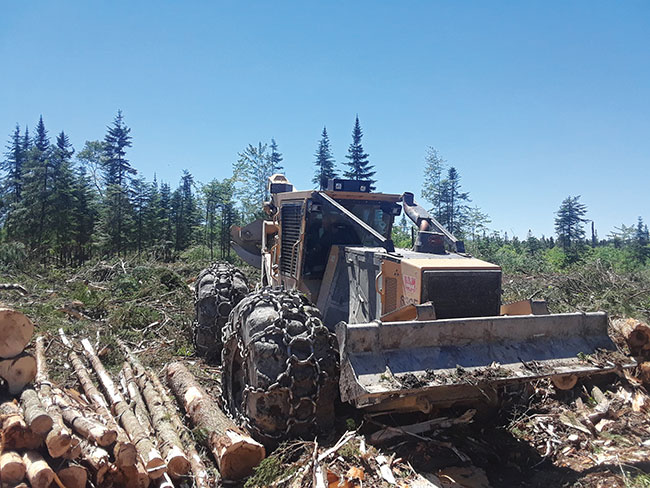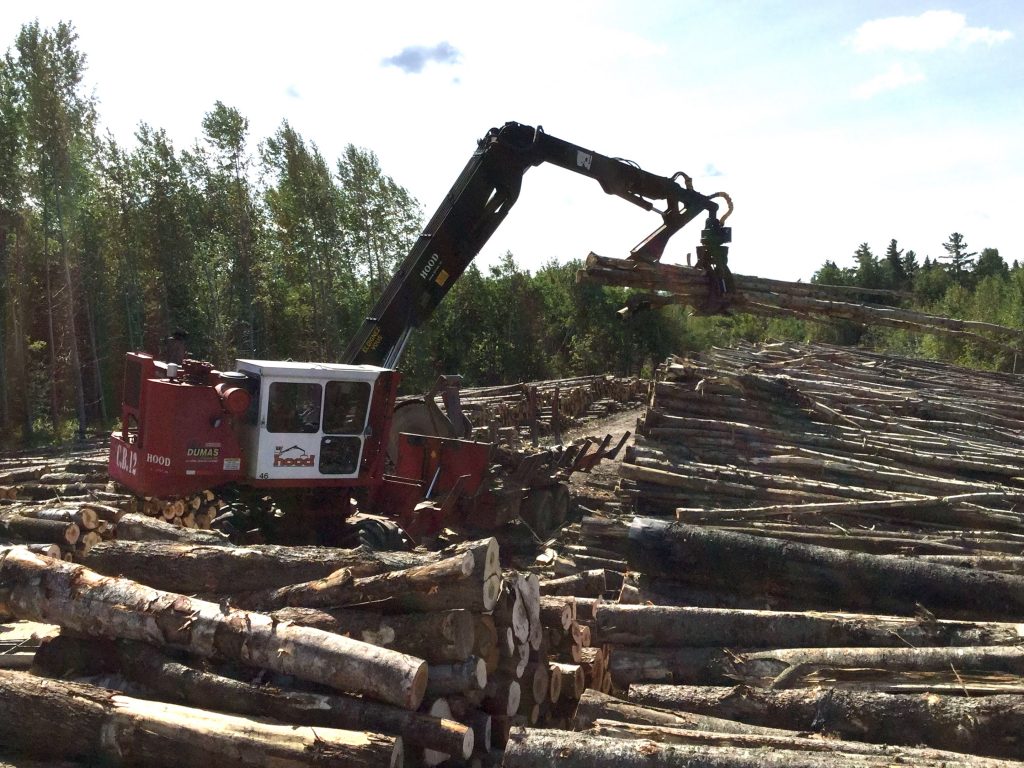
Features
Harvesting
Logging Profiles
A family affair: Dumas Canada takes on challenges facing the family business
December 17, 2019 By Maxime Bilodeau, translated by Peter Diekmeyer

When I last visited Dumas Canada in Saint-Côme-Linière, Que., dozens of tree fellers, de-limbers, skidders, excavators, bulldozers and other machinery jammed the yard. Melting winter snow had forced a month-long halt in operations out in the 60,000 hectares of mixed forests where the family business harvests 160,000 cubic metres of timber (two-thirds by gravel roads) each year for Domtar.
The Dumas garage, on the other hand, was teeming with activity. In one corner, mechanics worked on a disembarked semi-trailer. Others inspected a disassembled old Volvo loader.
“Some of our machines have more than 30,000 hours of use,” Serge Bourque says. “We won’t have much spare time once we head back into the woods in June. We will have to work. The time to fix things is now.”
Bourque, 47-years-old, partnered with his wife, Dominique Dumas, 46, to acquire the company earlier this year. It was a logical progression as Dominque had co-owned the business with her brothers, Daniel and Pierre Dumas, now both in their fifties, since 1995. The two men will support the incoming administration during an unspecified transition period.
“We are probably talking about a few years,” Daniel Dumas says.

Dumas Canada logs 160,000 cubic metres of timber each year for Domtar.
Recent developments
Bourque, who started as a measurer at Dumas Canada 23 years ago, knows the company well, particularly its transportation logistics division, where he also worked.
Dumas Canada’s dozen semi-trailer trucks make more than 5,000 trips a year. Today, Bourque also supervises cutting, as well as an increasing variety of other operations.
“Other than tree planting, we take care of everything from work site planning to transportation, roads and forestry technology,” he says. “We are audited every year to ensure that we meet Forest Stewardship Council (FSC) standards.”
Domtar’s plan to modify its pulp and paper mill facility, located in Windsor, Que., so that it can handle wood in various sizes, is also keeping Bourque busy. Eventually, Domtar plans to accept logs up to 24 feet. Fortunately, Dumas Canada is already equipped with chainsaws that can cut hardwood into the appropriate lengths.
“I see the change as a big positive,” Bourque says. “We will have to do some extra cutting. But, from now on we will be able to add value to all of the products that we cut.”
This opening could lead Dumas Canada to purchase a new de-limber, almost certainly from Pro Pac, which is also located in Saint-Côme-Linière.
“They are in our backyard – we would be crazy not to do business there,” Bourque explains. “They make simple and effective products and they are very attentive to our needs.”
The company also recently acquired an 822D track feller buncher and a 630E grapple skidder, both from Tigercat.

The Dumas Canada fleet includes two Tigercat feller bunchers: an 822D and an 855C.
The worker shortage challenge
The main challenge for them, however, is on the labour front. Like many businesses, Dumas Canada, which currently employs about 50 people, faces a shortage of skilled workers.
The situation is even more alarming in Beauce, Que., where the unemployment rate is just 2.7 per cent – the lowest in Quebec.
“Our challenges aren’t just in the forest,” Bourque says. “We also have to compete against other companies to attract competent and motivated people. It’s a war of competitiveness, but also of wages and working conditions.”
Of note: Dumas Canada’s machinery operators are part of the Domtar union, as they are also considered Domtar employees.
Working conditions at Dumas Canada are quite attractive. There are two daily shifts, from 5:30 a.m. to 2:15 p.m., and from 2:15 p.m. to 12:45 a.m.. The upshot is that workers get to go home every night.
“We don’t have marathon sixteen-hour shifts here,” Bourque says.
This strategy has paid for itself many times over: several employees have been with the company for decades. For example, mechanic Jacques Simard has been with Dumas Canada for 42 years and supervisor Benoît Larochelle has been with the company for 21 years.
Despite the good working conditions, potential hires are hardly lining up at the gates.
In the past, three to four people would drop off their resumes each week. But today, that only happens three to four times a year. The meagre pickings highlight the importance of offering workers flexibility and a good work-life balance.
“I am a father of four,” says Bourque. “I know all about work-family balance!”
Another generation?
Dumas Canada started out in Maine. It was founded by Leopold Dumas in the first half of the 20th century and was taken over by his son in 1959.
The third generation of the Dumas clan took over in 1995, shortly after obtaining a turnkey contract from Domtar, an event that also marked the end of the company’s American presence. Not surprisingly, family remains a core company value. But could a fourth generation of the Dumas family eventually take over?
“Right now, one of my kids is interested,” Bourque says. “If he is ready to take on new challenges, he will have a place.”
After all, the world will always need wood.
Equipment Matters
- Feller bunchers (2): Tigercat 822D, Tigercat 855C
- Skidders (3): Tigercat 630E (2), John Deere 748H
- De-limbers (3): Caterpillar 320C FM, Caterpillar 320D FM, John Deere 2054, all equipped with the Pro Pac PP-453
- Chainsaws (3): Tanguay TS150, Hood 24000, Pro Pac 600
- Excavators (3): Caterpillar 329, Caterpillar 322, Kobelco 200
- Loaders (2)
- Trucks (a dozen)
- Trailers (a dozen)
- Dump trucks (3)
- Bulldozers (2)
- Grader (1)
Print this page